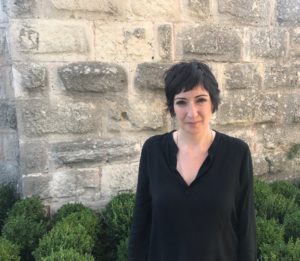The boundaries of the public and private spheres are drawn visually and physically over the borders. We want to emphasize the importance of thinking the private and public spaces through auditory, which is most of the time not taken into account. The sound remains outside the traditional definition of public space because of its nature, invisible and intangible but it does not prevent it from being regulated in the public sphere.
When does the sound belong to the private space, when does it belong to the public space? How can we re-read the construction of the public sphere through the history of the suppression of traditional voices in the public and private sphere by the imperial voices (eg, Velvele-i Medeniyye [Ferit Kam]? Taking these analytical differences into account, we propose a panel of five speakers where vocal cultural history is discussed.
Mustafa Avcı, “The public history of speakers: Amplified call to prayer”
The discussions on call to prayer is usually shaped around Turkish vs. Arabic adhan and the music of adhan. Even though these topcis are very important in the history of Turkey, one of the most significant issues in the history of religion, ethnomusicology and sound studies regarding Turkey is the beginning of the use of speakers on the minarets in the 1940’s and thus the amplification of the adhan. In this talk I will be discussing the implementation of speakars and amplification systems in and out of the mosques and the discussions revolving around these issues from the perspective of noise, bidat (innovation), modern sound regimes.

Mustafa Avcı (Mavcı) is an ethnomusicologist and a cultural historian. He is also a composer, lute and bağlama player. He is a full time faculty member at Altınbaş University, Social Sciences department. He graduated from Boğaziçi University, Department of Economics in 2005. He holds a Master’s Degree in Music from ITU – MIAM (Centre for Advanced Studies in Music) in 2009. He received his PhD degree in Music from New York University Music Department in 2015. His doctoral research was on Köçeks (cross-dressed male belly dancers/dancing boys) in the Ottoman Empire and contemporary Turkey and he also wrote his Ph.D. dissertation on the subject. Currently he is working on a monograph dealing with the music of the Ottoman Diaspora in New York. He is also working on a chronology project that chronologizes the musics of Ottoman Empire and Turkey.
Evrim Hikmet Öğüt, “Occupying the public space with voices: Syrian street musicians”
While multidimensional discriminatory practices generally lead migrants to become as invisible as possible in the city, Syrian street musicians occupy a public space, the most central part of Istanbul, with their voices. It is possible to consider Taksim Square and Istiklal Avenue as a place of encounter that is available and accessible to people from Turkey from almost all socio-economic backgrounds and migrants. Scrutinizing Syrian street musicians’ activities in this space presents the opportunity to understand not only the experience of migrants but also the local people’s, our, relationship with migration. If, after the transformations in recent years, we are to define and design Taksim anew as a public space, we need to take the new actors into consideration as well.

Evrim Hikmet Öğüt has completed her PhD in Ethnomusicology at Istanbul Technical University Centre for Advanced Studies in Music (MIAM) with a dissertation titled “Music in Transit: Musical Practices of the Chaldean-Iraqi Migrants in Istanbul”. She has completed her undergraduate studies and master’s program at Mimar Sinan Fine Arts University (MSGSU) Department of Musicology. Her master thesis is on the relation between contemporary music and contemporary poetry. She currently works as an associate professor at Ethnomusicology and Folklore Department, MSGSU. Her current research is on the musical practices of Syrian musicians in Turkey.
Haris Sahacic, “Quintessence as public space (Ether as public space)”
How does urban noise and pollution by infra-sound that is integrated in this noise, reflects on human nervous system, on plants and on animals’ navigation? Wireless routers overlap each other frequencies and can be easily disturbed by drones. How long they will technically, psychologically, economically, legally coexist? Radio and TV broadcasters are using digital transmission and analogue transmission is easily pulled out, where? Why public communications are pushed into the “economical”, “legal”, “political”, “informational”, and logical dependency on internet providers and their technology, how democratic is that? The industry of communication technology is developing and creating more and more public communication systems in order to justify itself as economy, is this “economy” poisoning or healing human conscience? How many levels of wireless interactions exist in one square meter of the public space?

Born in Sarajevo in 1977. In year 2011 graduated fine arts studying Media Design within the Faculty for Art and Design at the Bauhaus University in Weimar. Fields of studies wereExperimental radio, Interface design, European media culture. As author of numerous radio performances, features, radio dramas, radio art concepts, sound essays, art critics and poetry books in German and in Bosnian language in 2008 receives from Bauhaus University in Weimar and fromHans Böckler Foundation a scholarship for studies. He is a member of the Radio initiativebauhaus.fm and proud citizen of NSK State. Today working as Head of Administration and Radio of the Association for Culture and Art CRVENA. On 25th September 2009 receives by Medienanstalt Sachsen-Anhalt a Honorable mention for the radio work “Gattschaft Bericht”. Since June 2017 conducts in frame of the project trans-making one artistic research on “Quintessence as public space” that is implemented in one close cooperation with Relais Culture Europe and Scientific Research Center of the Slovenian Academy of Sciences and Arts.
Event Timeslots (1)
Saturday
-
Mustafa Avcı, Evrim Hikmet Öğüt, Haris Sahacic